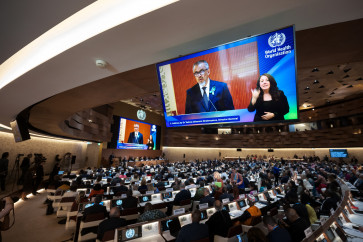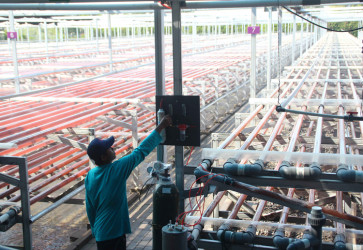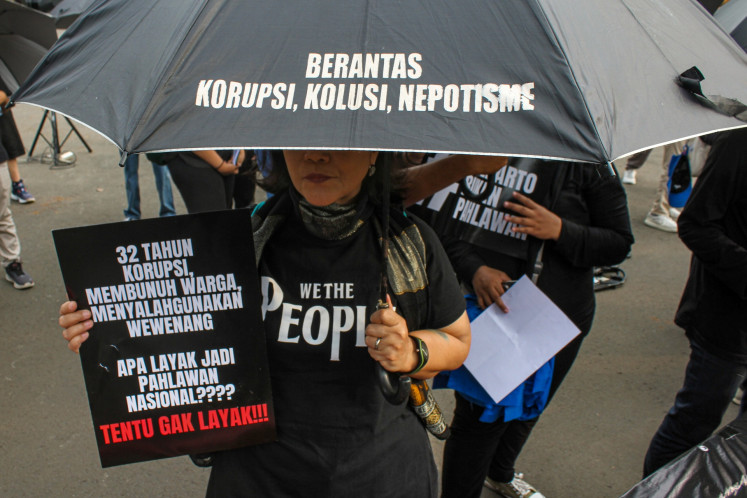Emerging countries: Projections and pitfalls
At the Indonesian Defense Ministry some years ago, a foreign management consultant advised the ministry to “streamline and restructure” its units and to be more “transparent, efficient and agile”
Change text size
Gift Premium Articles
to Anyone

A
t the Indonesian Defense Ministry some years ago, a foreign management consultant advised the ministry to “streamline and restructure” its units and to be more “transparent, efficient and agile”.
Like in any other industry (for example in marketing, poverty alleviation or human rights), the smooth professionalism of the management consultant had its habit of using the latest buzz words, and killer Powerpoint and pie-chart presentations, to convince potential clients to adapt his version of what constituted a “revamped and transformational” Indonesian defense force.
I was then aware of US defense secretary Don Rumsfeld’s penchant to use his own favorite buzzwords about “restructuring” the Pentagon and “remaking” the US military to be both “lethal and agile”. I politely told the consultant, using appropriate Rumsfeldian-speak that “goodness gracious me”, the Indonesian Defense Ministry’s tight budget could not afford to pay for the services offered.
As I now read advertorials, multilateral agency reviews and magazine special reports about “the dizzying economic growth rates” in Brazil, Russia, India, China and a host of other “emerging markets”, I often have the same eerie feeling that optimistic prognoses about “the new globalism” driven by Asian “connectivity” and Latin American “dynamism” were recycled themes of the “East Asian Miracle” of the early 1990s.
Doubtless, some emerging countries in Asia are now better equipped to “redefine and transform” the “new globalism” of the 21st century. Asia now is different in scale as well as in its qualitative ability to push for more robust regional and global development. There is talk about “the population bonus” in India and Indonesia, for example, with each county having a demographic profile of 65 percent of the population under the age of 40 by 2040. The implied advantage is that in contrast, Japan’s and China’s population of those over 65 would comprise more than 60 percent of the population.
The promise of 350 million Indian or 360 million Chinese and even 50 million Indonesians seeking private housing, cars, electronic gadgets, foreign holidays and study at colleges and universities in North America and Europe is also tempting. That is the real bonus targeted by Western consultants, public relations companies, promotional outfits, advisory firms, all joining the fray to secure market share.
The myth and mystery of numbers are unabashedly regurgitated in numerous brochures and company profiles of American, European and rich Middle-Eastern banks and companies investing in manufacturing, banking and energy services in China, India and other growth markets. The annual franchises of Davos, Boao and World Economic Forum summits are part of obligatory corporate marketing schemes across Asia and Europe.
Depictions of “one billion consumers” in China, India and Indonesia are seen as a sure sign that even if only one-quarter or one-third of that number is achieved, it would be enough to entice producers of consumer goods in advanced countries to expand market share for their cars, electronics, apartments and other luxury goods. Recent hype promoted by a European bank advertorial brazenly noted that China’s GDP in 2010 was US$9.2 trillion, well above the estimates of most multilateral agencies.
Data in these projections are constantly “updated” by marketing hacks and macro-economists who work in the agencies, consultancies and financial houses in Europe and North America.
Their assumptions and projections are littered with printouts of aggregate data, macro statistics and time series projections based on sophisticated “research findings” across nations and regions. Presentations, reviews, summit briefings and special reports provide statistics on “emerging urban growth centers” in China, India, Indonesia, Brazil and South Africa.
It is no coincidence that they often talk more about “emerging markets” or “prospective growth economies” rather than countries and states. The difference between the “market size” and “real economic strength” of a country is never made clear or emphasized.
Market projections seldom report about quality of life indicators that are devastatingly more important: Urban blight, widespread rural poverty, meager access to clean water, limited public housing, lack of infrastructure, horizontal and vertical inequality across provinces, islands and regions within each particular country.
Least of all, there is seldom a mention of the need for public and private security by relatively responsive, relatively effective and relatively efficient military. It is only recently that in Iraq, Afghanistan and Pakistan that many officials of NATO countries have acknowledged the need for a carefully calibrated “nation-building” program provided by the local military at ground-level.
The World Bank’s World Development Report 2011 fails to mention the critical role of the military in nation stabilizing. Reflecting its liberal bias and politically correct stance, the report fails to mention the pivotal role of the military in support of civilian authorities to establish public order, particularly during critical transitional phases.
Constant revision by the bank’s hurriedly hired team of economists, psychologists, anthropologists and political scientists delayed publication of the report, which may have also been influenced by the unexpected social and political unrest in Tunisia, Egypt and Yemen in early 2011.
The lessons about country economic and business prognoses are clear: There needs to be constant vigilance in discerning any presentations and projections about a particular country at any given time. Ultimately, there are hidden biases, rigid preferences as well as built-in political and economic self-interest that help a particular agency or private enterprise in courting favor to a particular client.
A failure to account for the cultural, historical and geopolitical context of any emerging economy will almost always lead to fatal pitfalls lurking beyond the experts’ best guesstimates.
The writer is currently professor of international relations and geopolitics at the University of Indonesia. He is former minister of defense, of education and of environment. He has served as ambassador of the Republic of Indonesia at the Court of St. James in London. His doctor’s degree in political science was obtained at the London School of Economics and Political Science.









